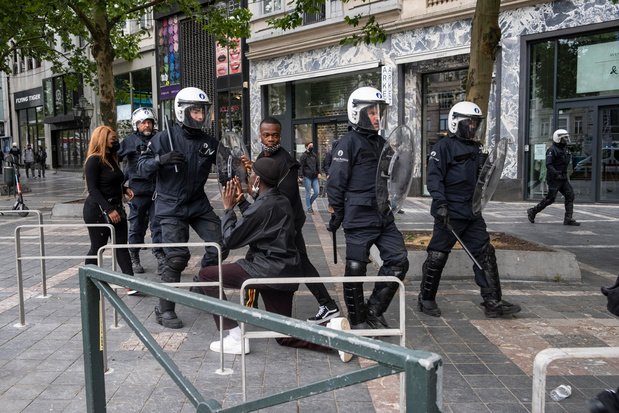The League for Human Rights is pointing its finger at the Belgian police regarding abuse during the coronavirus lockdown, La Libre Belgique and La Dernière Heure reported.
The League's accusations are based on testimonies of hard-core arrests collected in an analysis by its Police Violence Observatory, PoliceWatch, which was founded on 15 March 2020.
"We started this research after being alerted by testimonies of police abuse circulating on social networks and in the press," said Saskia Simon, PoliceWatch coordinator.
Related News
- Arrest in Uccle: Police officers' technique was 'entirely legal'
- 17-year-old girl arrested for looting after BLM protest
"At the beginning of April, we decided to launch a campaign to collect secure testimonies on our site," Simon said.
The website has two forms - one for victims and one for eyewitnesses. During the lockdown, 80 victim forms were filled out and 31 eyewitness forms. These were studied and some were put aside, either because the events occurred before the lockdown, it wasn't a case of police abuse, or the events occurred outside of Belgium.
A total of 75 testimonies were selected, concerning events that took place in Wallonia and Brussels between 18 March and 29 May. The data was cross-referenced with data from other organizations, such as Unia or Médecins du Monde.
"Among the most regularly reported abuses, the top three are, in descending order, beatings (36%), arrests (33%) and administrative fines (31%)," the report said. "Next come insults (21%), searches (16%) and the use of handcuffs or collars (12%)."
"Our analysis shows trends that only confirm what many reports written by a multitude of actors, and not only the League for Human Rights, say, namely that young people, racialised people and people in precarious situations are likely to have more serious problems, such as arrests with the use of force," Simon explained.
"When a white and older person is penalized for not respecting the confinement with a fine, the same behaviour by a young person from a disadvantaged neighbourhood will be penalized with a fine which is more likely to be accompanied by violence," she said.
The numbers probably underestimate the number and seriousness of cases, according to the League for Human Rights.
Jason Spinks
The Brussels Times

